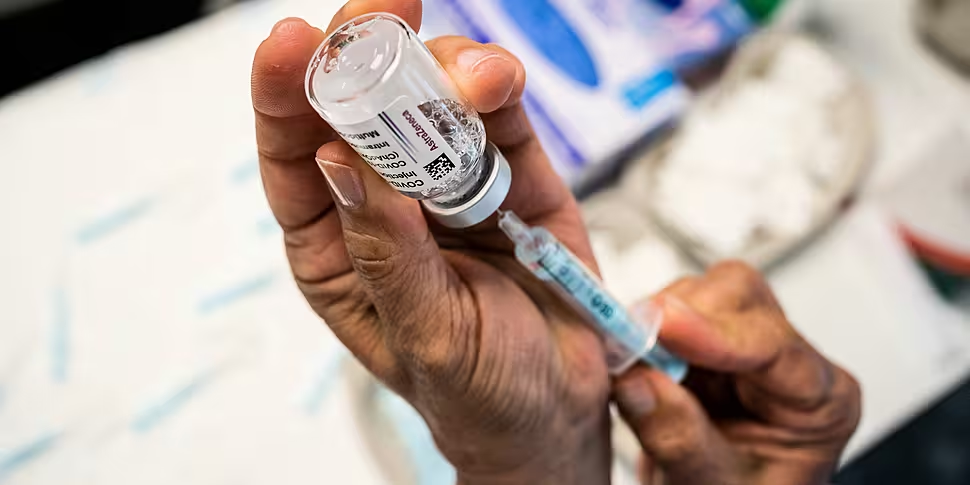The National Immunisation Advisory Committee (NIAC) has issued new advice on the use of the AstraZeneca COVID-19 vaccine.
It said the drug is "not recommended for those aged under 60 years", including those with medical conditions with very high or high risk of severe COVID-19 disease.
Advice for those who have received a first dose of AstraZeneca - also known as Vaxzevria - is that those aged 60 and older should receive their second dose 12 weeks later as scheduled.
However a second dose should not be given to anyone who developed "unusual blood clots with low platelets after the first dose".
Those aged under 60 years "with a very high risk or high-risk medical condition" should receive their second dose 12 weeks later as scheduled.
While people under 60 years "without a very high risk or high-risk medical condition" should have the scheduled interval between doses extended to 16 weeks.
This is to allow "further assessment of the benefits and risks as more evidence becomes available", NIAC said.
This advice follows concerns about rare blood clots from the European Medicines Agency (EMA).
Last week, it found the AstraZeneca vaccine can lead to blood clots in "very rare cases."
But the regulator noted that the benefits of the vaccine outweigh the risk of any side effects.
Echoing this, NIAC said on Monday: "These rare events are estimated to occur between four and 10 in every one million people, one of whom may die."
A number of other European Union countries have also issued revised advice on the drug.
NIAC said it consulted widely with EU colleagues, specialists in blood clotting and HIQA for input to these recommendations.
As of April 7th, the Health Products Regulatory Authority (HPRA) has been notified of approximately 2,800 reports of suspected side effects associated with AstraZeneca.
This is out of 204,270 doses administered.
The HPRA said it has received notice of a case of "special interest" and is continuing to follow up on this to see if it fits the profile of the very rare blood clots which were the subject of the EMA review.
An additional small number of cases describing low platelet counts have been received, and follow up is also ongoing to rule out the presence of blood clots.
'Vaccine is highly effective'
NIAC chair, Professor Karina Butler, said: "All the authorised COVID-19 vaccines - Pfizer, Moderna and AstraZeneca, and the newly-approved Janssen - are highly effective in preventing hospitalisation and severe COVID-19 disease.
"Vaccination with Vaxzevria COVID-19 AstraZeneca vaccine is highly effective and substantially reduces the risk of severe COVID-19 disease across all age groups.
"NIAC realises the need to balance the significant benefits of a national vaccination programme with the very rare risk of these reported events.
"While this is an extremely rare condition, consideration must be given to the fact that it has a very high risk of death or severe outcome.
"As the risk/benefits of Vaxzevria COVID-19 AstraZeneca vaccine may vary by age and as alternative COVID-19 vaccines are available NIAC has revised the recommendations for use of this vaccine.
"In developing these recommendations, NIAC is informed by the available scientific evidence and the risk/benefits of the vaccines.
"New evidence will be reviewed once available and any further required recommendations will be notified to the Department of Health".
Prof Butler added: "We strongly encourage everyone to accept the COVID-19 vaccine they are offered.
"A high uptake of vaccine in every age group is needed if COVID-19 is to be controlled, so that public health restrictions may be safely removed".
Read the full NIAC recommendations here
AstraZeneca response
In a statement, AstraZeneca said: "We recognise the decision taken by the National Immunisation Advisory Committee (NIAC).
"Implementation and rollout of the vaccine programme is a matter for each country to decide.
"Reviews from the regulatory authorities in the EU and UK have reaffirmed the vaccine offers a high-level of protection against all severities of COVID-19 and that these benefits continue to far outweigh the risks.
"Neither agency identified any risk factors, such as age or gender, or a definite cause for these extremely rare blood clotting events.
"In addition the World Health Organisation last week noted that, whilst concerning, the events under assessment are extremely rare, with low numbers reported among the almost 200 million individuals who have received the AstraZeneca COVID-19 vaccine around the world.
"Of these 200 million people, real-world data has suggested thousands of deaths have been prevented."
The statement added: "AstraZeneca has worked closely and quickly with regulators to implement changes to the product information and understand the epidemiology and possible mechanisms that could explain these extremely rare events.
"We will continue to collaborate with the NIAC in order to provide all available data to inform their decisions."
'800,000 out of four million'
Speaking on The Hard Shoulder earlier, DCU Health Systems Professor Anthony Staines said this change could complicate things.
"I think it will make it a little more complicated because they have to work out the logistics of getting the AstraZeneca to older people.
"They're planning about 800,000 AstraZeneca doses out of just under four million between now and the end of June.
"So it's not in any sense the end of the world".
But Prof Staines explained: "They're going to have to figure out how to get the AstraZeneca to the same place as the older people at the right time.
"At the moment they're sending single batches of particular vaccines to a particular clinic, and it doesn't matter who turns up.
"If you turn up today and it's AstraZeneca there today, that's what you get - and if you turn up tomorrow and it's Pfizer there tomorrow, you get Pfizer.
"But now because different groups will be getting different vaccines, it's a little more complicated to organise.
"But nothing undoable, nothing impossible".









